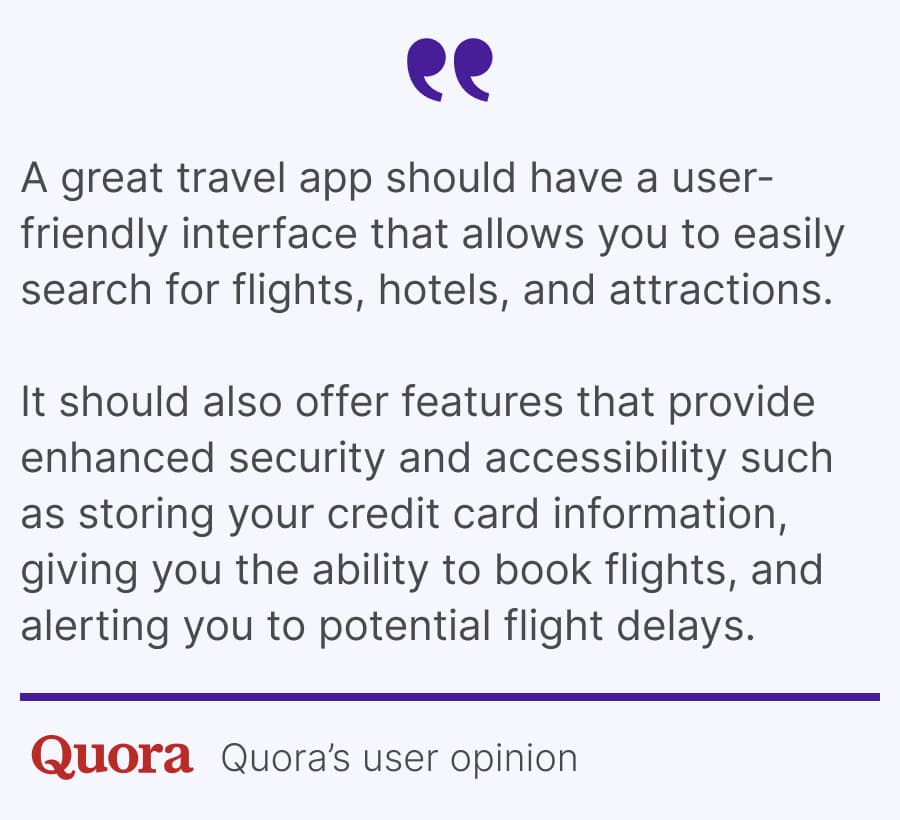Must-Have Features for Successful Travel App Development
Topic: Guides

April 18, 2024
In today's fast-paced digital landscape, travel apps have become an indispensable tool for modern explorers. As the travel and tourism industry continues its upward trajectory, fueled by an insatiable desire for new experiences, technology plays a pivotal role in shaping the way we plan, book, and experience our journeys.
According to the “State of Mobile 2024” report, in 2023 travel app downloads numbered more than 3 billion – up 13% from 2.7 billion in 2022. This growth underscores the importance of innovation in catering to the evolving needs and expectations of travelers worldwide.
In one of the previous articles, we analyzed the process of travel app development. Now it's time to take a closer look at the travel apps’ features.
Booking and Reservation Features
At the core of any successful travel app lies the ability to seamlessly book flights, hotels, restaurants, activities, and transportation. In-app booking functionality streamlines the process, enabling users to search for availability, compare prices, read reviews, and secure reservations with a few taps on their mobile devices.
Integration with established third-party booking platforms, such as online travel agencies (OTAs) and global distribution systems (GDSs), is crucial for providing users with a comprehensive selection of options.
Additionally, personalized recommendations tailored to individual preferences, travel styles, and budgets can significantly enhance the user experience and increase customer satisfaction. Prominently displaying travel deals and discounts can also incentivize users to book through the app.
Travel Navigation and Mapping
Navigating unfamiliar territories can be a daunting task, but travel apps equipped with robust navigation and mapping features can alleviate these concerns. Real-time GPS navigation and location-based services allow users to pinpoint their current position, plan optimal routes, and receive travel directions to their desired destinations, points of interest, or landmarks. For example, a user visiting Paris could use the app's GPS to get directions from their hotel to the Eiffel Tower.
Offline maps are particularly valuable in areas with limited connectivity, ensuring that travelers can continue to access maps, navigation, and essential location data even when internet access is unavailable. This could be useful for hikers exploring remote trails or travelers visiting rural areas without reliable cellular coverage.
Integration with public transportation information, such as bus and subway routes in cities like London or New York, further simplifies the travel experience, enabling users to seamlessly plan and navigate using various modes of transportation. Real-time traffic updates can also help travelers avoid congestion and plan more efficient routes.

Travel Itinerary and Planning
Crafting a well-organized itinerary is crucial for maximizing the enjoyment and efficiency of any trip. Travel itinerary builder features within a trip planner app allow users to create comprehensive itineraries tailored to their specific interests, budgets, and time constraints. For example, a family planning a week-long vacation to Disney World could use the app to map out which parks to visit on different days and make reservations for dining and activities.
Automatic itinerary generation based on user inputs, such as preferred destinations, activities, and travel dates, can significantly streamline the planning process. Additionally, shareable itineraries and collaborative travel planning features enable travelers to coordinate and plan trips with friends, family, or travel companions, fostering a more seamless and enjoyable group experience.
A couple could share a draft itinerary for their honeymoon in Hawaii and get feedback from friends who have been there before. Having a customizable itinerary that can be modified on the fly is also important for flexibility - if poor weather cancels a hiking day, the app makes it easy to reschedule.
Travel Assistance
Venturing into unfamiliar territories often presents challenges related to language barriers, currency exchange rates, and access to local information. Travel apps that incorporate currency converters and language translation tools can alleviate these obstacles, empowering travelers to navigate foreign environments with greater confidence and ease.
Access to up-to-date local information, such as travel weather forecasts, local events & attractions calendars, and emergency assistance resources further enhances the travel experience by ensuring that users can make informed decisions and fully immerse themselves in their surroundings safely. Travel safety tips related to potential risks, local laws and customs, and access to medical services can provide invaluable peace of mind for travelers, especially in unfamiliar or potentially risky destinations.
Social and Sharing Features
Travel is often an inherently social experience, and travel apps that foster community engagement can significantly enrich the overall journey. Features that allow users to connect through a travel community app and share recommendations, photos, and experiences cultivate a vibrant social aspect.
The ability to share travel experiences, photos, videos, and travel recommendations through the app or by integrating with popular social media platforms can inspire others, contribute to a lively travel community, and potentially influence the future travel decisions of fellow users. Travel photo-sharing features enable users to post visual highlights of their trips.
User-generated content, such as ratings, comments, and evaluations of various travel services or destinations, can provide valuable travel recommendations and insights for others planning similar adventures. This social connectivity enhances the overall quality and trustworthiness of the app.
Personalization and Loyalty
Personalization is key to delivering a tailored and engaging user experience in the travel app space. By creating travel user profiles that capture individual travel preferences, travel styles, budgets, and interests, apps can offer highly relevant recommendations, personalized content, and targeted offers that resonate with each user's unique needs and desires.
Travel loyalty programs and travel rewards programs for frequent users can foster long-term engagement and encourage repeat business. These programs may include exclusive discounts, early access to deals, or special perks for loyal customers. Targeted travel app notifications and offers based on user behavior and travel patterns can further enhance personalization, ensuring that users receive timely and relevant information that enhances their overall travel experience.
Monetization and Revenue Streams
While many travel apps offer free basic functionality, successful monetization strategies are crucial for sustaining and growing the business. Common revenue streams include in-app purchases, such as premium features or travel app subscriptions, advertising, and sponsored content, as well as commission-based revenue from bookings and reservations made through the app.
Revenue Stream | Description | Considerations |
|---|---|---|
In-app Purchases & Travel App Subscriptions | Users pay for premium features, advanced functionality, or recurring access to the app's services. | Need to balance free and paid offerings to attract users while generating revenue. The clear value proposition is key. |
Travel App Advertising & Sponsored Content | Apps display ads or sponsored content from travel partners, generating revenue through impressions or clicks. | Risk of disrupting user experience if ads are intrusive or irrelevant. Need to carefully integrate ads without compromising app quality. |
Travel Booking Commissions | App earns a commission or percentage of bookings and reservations made through the platform. | Requires partnerships with travel providers and may limit user choices to partnered services. Commission rates need to be competitive. |
Striking a balance between monetization efforts and providing a seamless, ad-free user experience is essential for maintaining user satisfaction and loyalty. Transparent pricing models and clear communication of the value proposition can help justify any paid features or services offered within the app.
Security and Privacy
In an era of heightened concern over data privacy and cybersecurity, travel app security measures must be a top priority. Data encryption and secure payment processing are essential for protecting users' personal and financial information from potential threats or breaches.
Compliance with data protection regulations, such as the General Data Protection Regulation (GDPR) and the California Consumer Privacy Act (CCPA), is not only a legal requirement but also a critical factor in building trust with users. Providing a transparent travel privacy policy and giving users control over their user data protection, including the ability to review, modify, or delete personal information, further demonstrates a commitment to privacy and transparency. Ensuring GDPR compliance helps build confidence that the app respects data rights.

Conclusion
As the travel industry continues to evolve and adapt to changing consumer demands, the development of feature-rich and user-friendly travel apps has become paramount. By incorporating the must-have features outlined in this article, travel apps can deliver exceptional experiences that cater to the needs of modern travelers.
Staying ahead of evolving user expectations and industry trends is crucial for success in this highly competitive market. Continuous innovation, user feedback integration, and a deep understanding of traveler pain points and desires will be the driving forces behind the development of future travel app features that redefine the way we explore the world.
Cyfrania team can boast of developing a successful booking platform that enables complete trip arrangements to the Bahamas - including flights, hotels, transfers, and tours - all through a single web application. The main challenge was creating a seamless booking experience that integrated multiple travel components like flights across airlines, hotel rooms from various property management systems, transfers, island tours, customized pricing/taxes/fees, and the ability to apply promotions.
If you also want to develop a travel app or have any questions on the topic, feel free to contact us. With over 20 years of experience building various apps, our team can guide you from concept to launch.
Sources for Further Reading
-
What are the most important features in a travel app for mobiles? - an article on Medium
-
15 Must-Have Features Of A Successful, User-Friendly Mobile App - an article on Forbes
-
What are the most important features in a travel app? - a discussion on Quora
-
Digitalization of the travel industry - statistics & facts provided by Statista